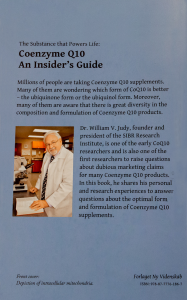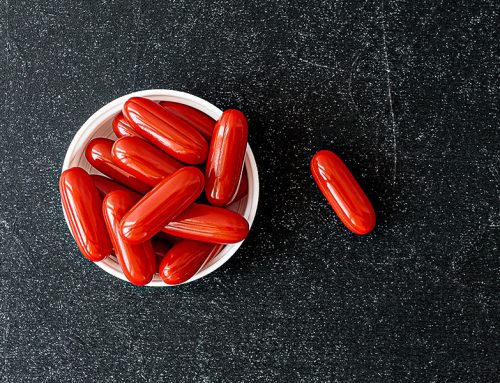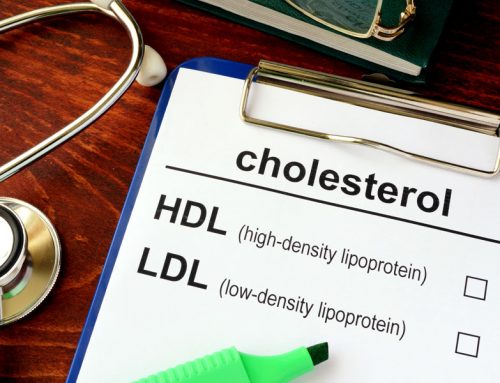
Long-time Coenzyme Q10 researcher Dr. William Judy says that there is considerable individual variation in blood CoQ10 concentrations. Generally, though, he regards a plasma or serum CoQ10 level below 0.60 micrograms per milliliter as a warning sign.
Japanese cardiologists have reported a significant connection between low Coenzyme Q10 status and the risk of death from heart disease and other causes [Shimizu 2020].
- The researchers collected and examined blood samples from 242 men and women admitted to Juntendo University Hospital’s coronary care unit in Tokyo.
- They followed the heart disease patients for a three-year period.
- 58 of the 242 patients (24%) died during the follow-up period from heart disease, cancer, infection, and other causes.
- The patients who died had an average blood CoQ10 concentration of 0.48 micrograms per milliliter. The patients who survived had a higher average blood CoQ10 concentration of 0.58 micrograms per milliliter.
- Overall, the researchers found that patients with a “higher” blood CoQ10 concentration of 0.46 or greater micrograms per milliliter had a 52% lesser likelihood of dying from all causes than did the patients with blood CoQ10 concentrations below 0.46 micrograms per milliliter.
- Nota bene: The patients with the low CoQ10 blood levels were the patients with the higher dosages of statin medications.
Why Low CoQ10 Levels are Associated with Heart Disease Mortality

In his book Insider’s Guide to Coenzyme Q10, Dr. Judy discusses the effects of increasing age, malnutrition, and statin medications on blood Coenzyme Q10 levels and the consequent effect on heart function. Available from amazon.com. ISBN: 978-87-7776-186-7.
This research shows that heart disease patients with lower blood CoQ10 levels are at greater risk of dying sooner than heart disease patients with higher blood CoQ10 levels [Shimizu 2020].
- Statin medications are known to inhibit the body’s endogenous production of Coenzyme Q10; logically, every heart patient taking a statin medication will need adjunctive Coenzyme Q10 treatment. Okuyama et al [2015] have explained the mechanisms by which statin medication may increase the risk of developing atherosclerosis and heart failure.
- Lower blood CoQ10 levels are also associated with greater age [Shimizu 2017]. Malnutrition among senior citizens may be contributing to low CoQ10 status; this is another argument for supplementation.
- Adequate levels of Coenzyme Q10 are associated with reduced levels of blood bio-markers for inflammation, in particular interleukin 6, C-reactive protein, and tumor necrosis factor alpha [Fan 2017].
Evidence from CoQ10 Supplementation and Heart Disease Studies
- Professor Urban Alehagen’s KiSel-10 Study has shown that daily supplementation of senior citizens with Coenzyme Q10 and selenium-enriched yeast for four years cuts the risk of heart disease in half [Alehagen 2013].
- Professor Svend Aage Mortensen’s Q-Symbio Study has shown that adjunctive treatment of chronic heart failure patients with Coenzyme Q10 for two years significantly reduces the risk of death from heart disease and of death from all causes [Mortensen 2014; Mortensen 2019].
Bottom Line: CoQ10 Status and Cardiovascular Disease risk
Adequate levels of Coenzyme Q10 are essential to the cells’ production of ATP energy; moreover, Coenzyme Q10 is an important lipid-soluble antioxidant that scavenges harmful free radicals [Shimizu 2017].
- In the KiSel-10 Study, the senior citizens received 2 times 100 milligrams of Coenzyme Q10 daily [Alehagen 2013].
- In the Q-Symbio Study, the heart failure patients received 3 times 100 milligrams of Coenzyme Q10 daily [Mortensen 2014].
Separate doses of CoQ10, taken with meals containing some fat, will give a better absorption than single doses will [Singh 2005].
The formulation of the CoQ10 supplement – the combination of carrier oils and the heating/cooling process is much more important to absorption and bio-availability than the form of the CoQ10 supplement is. Whether the CoQ10 supplement is composed of ubiquinone or ubiquinol is much less important than the care the manufacturer puts into the formulation of the supplement [Lopez-Lluch 2019].
Remember: All Coenzyme Q10 formulations are not equally well absorbed. It is a bit of a gamble to buy a cheap CoQ10 supplement. Without absorption, there cannot be good health health effects.
Read our key article about CoQ10 and cardiovascular health in elderly people
Read our key article on CoQ10 as adjuvant therapy for heart failure
Sources
Alehagen U, Johansson P, Björnstedt M, Rosén A, Dahlström U. Cardiovascular mortality and N-terminal-proBNP reduced after combined selenium and coenzyme Q10 supplementation: a 5-year prospective randomized double-blind placebo-controlled trial among elderly Swedish citizens. Int J Cardiol. 2013 Sep 1;167(5):1860-6. doi: 10.1016/j.ijcard.2012.04.156. Epub 2012 May 23.
Fan L, Feng Y, Chen GC, Qin LQ, Fu CL, Chen LH. Effects of coenzyme Q10 supplementation on inflammatory markers: A systematic review and meta-analysis of randomized controlled trials. Pharmacol Res. 2017 May;119:128-136. doi: 10.1016/j.phrs.2017.01.032. Epub 2017 Feb 5.
López-Lluch G, Del Pozo-Cruz J, Sánchez-Cuesta A, Cortés-Rodríguez AB, Navas P. Bioavailability of coenzyme Q10 supplements depends on carrier lipids and solubilization. Nutrition. 2019 Jan;57:133-140. doi: 10.1016/j.nut.2018.05.020. Epub 2018 Jun 27
Mortensen SA, Rosenfeldt F, Kumar A, Dolliner P, Filipiak KJ, Pella D, Alehagen U, Steurer G, Littarru GP; Q-SYMBIO Study Investigators. The effect of coenzyme Q10 on morbidity and mortality in chronic heart failure: results from Q-SYMBIO: a randomized double-blind trial. JACC Heart Fail. 2014 Dec;2(6):641-9. doi: 10.1016/j.jchf.2014.06.008. Epub 2014 Oct 1.
Mortensen AL, Rosenfeldt F, Filipiak KJ. Effect of coenzyme Q10 in Europeans with chronic heart failure: A sub-group analysis of the Q-SYMBIO randomized double-blind trial. Cardiol J. 2019;26(2):147-156. doi: 10.5603/CJ.a2019.0022. Epub 2019 Mar 5.
Okuyama H, Langsjoen PH, Hamazaki T, Ogushi Y, Hama R, Kobayashi T, Uchino H. Statins stimulate atherosclerosis and heart failure: pharmacological mechanisms. Expert Rev Clin Pharmacol. 2015 Mar;8(2):189-99. doi: 10.1586/17512433.2015.1011125. Epub 2015 Feb 6.
Shimizu M, Miyazaki T, Takagi A, Sugita Y, Ouchi S, Aikawa T, Shiozawa T, Hiki M, Takahashi S, Hiki M, Shimada K, Daida H. Low coenzyme Q10 levels in patients with acute cardiovascular disease are associated with long-term mortality. Heart Vessels. 2020 Sep 16. doi: 10.1007/s00380-020-01698-7. Epub.
Shimizu M, Miyazaki T, Takagi A, Sugita Y, Yatsu S, Murata A, Kato T, Suda S, Ouchi S, Aikawa T, Hiki M, Takahashi S, Hiki M, Hayashi H, Kasai T, Shimada K, Miyauchi K, Daida H. Low circulating coenzyme Q10 during acute phase is associated with inflammation, malnutrition, and in-hospital mortality in patients admitted to the coronary care unit. Heart Vessels. 2017 Jun;32(6):668-673. doi: 10.1007/s00380-016-0923-x. Epub 2016 Dec 9.
Singh RB, Niaz MA, Kumar A, Sindberg CD, Moesgaard S, Littarru GP. Effect on absorption and oxidative stress of different oral Coenzyme Q10 dosages and intake strategy in healthy men. Biofactors. 2005;25(1-4):219-24. doi: 10.1002/biof.5520250127.
The information presented in this review article is not intended as medical advice and should not be used as such.
30 November 2020









Leave A Comment